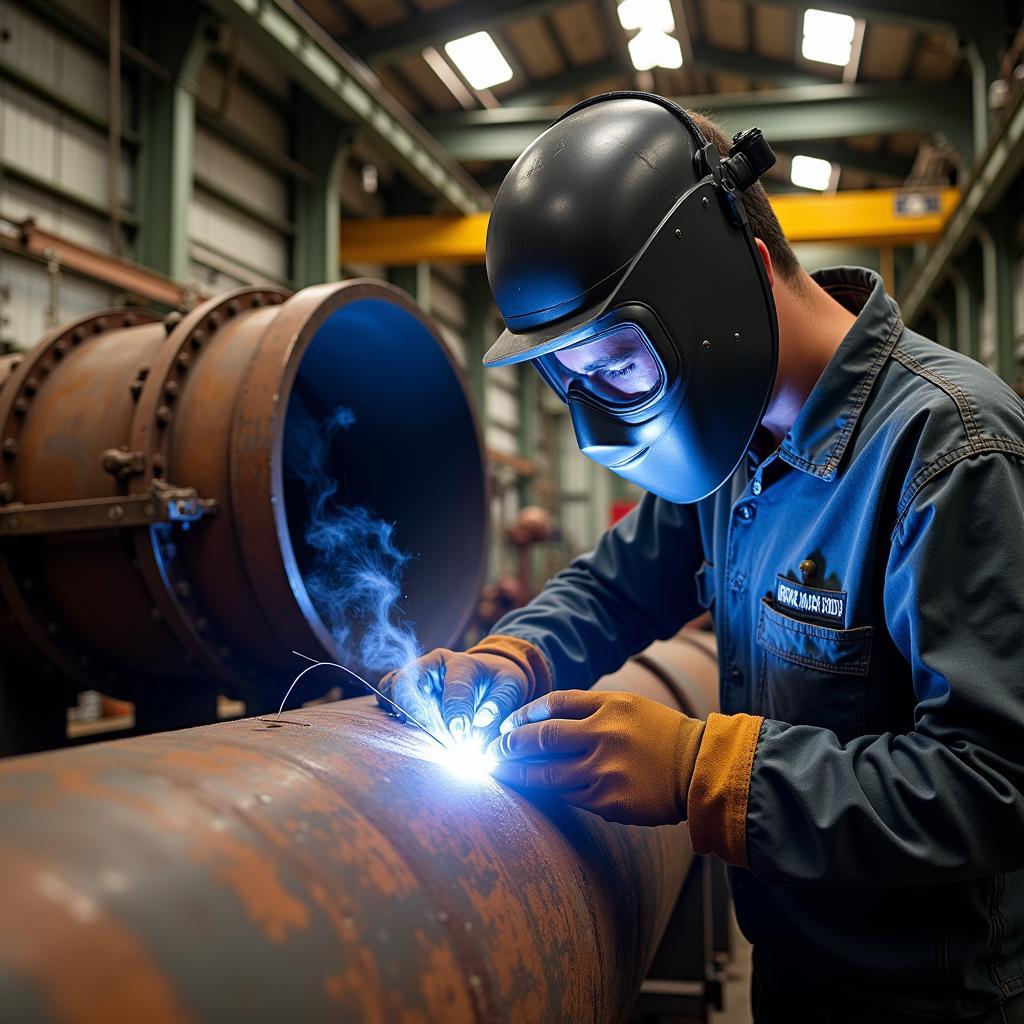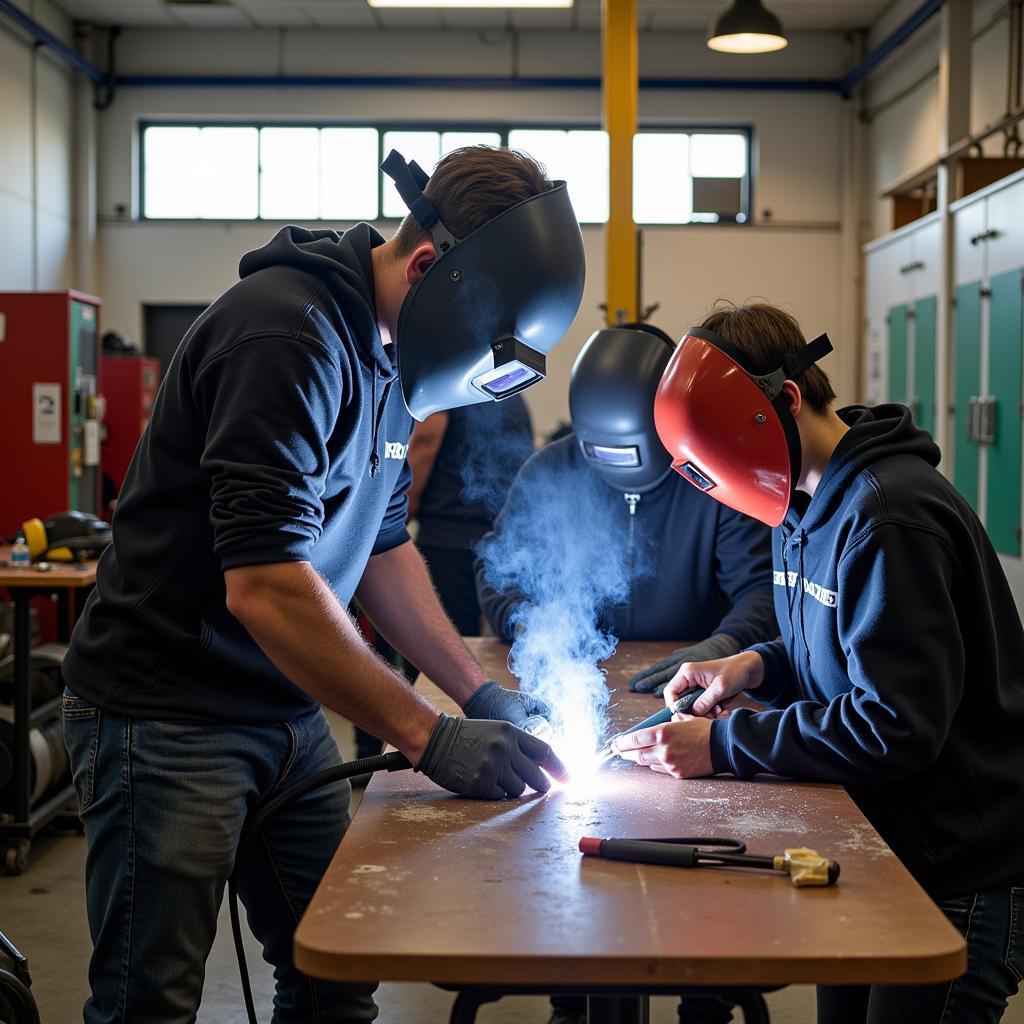Welding is a crucial skill in high demand across various industries in Pakistan. This guide explores the promising landscape of Welder Jobs In Pakistan, offering insights into the required skills, potential salaries, and career paths. We’ll cover everything you need to know to ignite your welding career.
Exploring Welder Jobs in Pakistan
The demand for skilled welders in Pakistan is steadily increasing, fueled by growth in construction, manufacturing, and energy sectors. From constructing massive infrastructure projects to crafting intricate metal components, welders play a vital role in shaping the nation’s future. This creates diverse and exciting opportunities for those with the right skills and qualifications. Whether you’re a seasoned professional or just starting out, understanding the current job market and specific requirements is essential.
Types of Welder Jobs and Required Skills
Different welding jobs require varying skill sets and specializations. Some common types of welder jobs in Pakistan include:
- Structural welders: These professionals specialize in welding the structural framework of buildings, bridges, and other large structures. They need a strong understanding of blueprints, structural design, and safety regulations.
- Pipe welders: Working primarily in the oil and gas, petrochemical, and water industries, pipe welders join and repair pipes, requiring precision and expertise in working with various pipe materials.
- TIG welders (Tungsten Inert Gas): TIG welding is often used for more intricate and precise welding tasks, demanding a high level of skill and attention to detail. Industries like aerospace and automotive rely heavily on TIG welders.
- MIG welders (Metal Inert Gas): MIG welding is a faster and more versatile process commonly used in manufacturing and fabrication. MIG welders need to be proficient in operating MIG welding equipment and understanding different metal types.
Regardless of specialization, all welders need a solid foundation in:
- Safety procedures: Welding can be a hazardous job, so prioritizing safety is paramount. Understanding and adhering to safety protocols is crucial.
- Blueprint reading: Interpreting blueprints and technical drawings is essential for understanding project requirements.
- Welding techniques: Mastering different welding techniques, including TIG, MIG, and arc welding, opens up a wider range of job opportunities.
- Metal properties: Knowledge of different metal types and their characteristics ensures proper welding procedures and strong, reliable joints.
Salaries and Career Progression for Welders
The salary for welder jobs in Pakistan varies depending on experience, skills, and location. Entry-level welders can expect a competitive starting salary, while experienced and specialized welders can earn significantly more. With experience and further training, welders can advance to senior positions like welding supervisors, inspectors, or even start their own welding businesses.
Finding Welder Jobs in Pakistan
Numerous resources can help you find welder jobs in Pakistan:
- Online job portals: Websites like Rozee.pk and Indeed.com list various welding job openings across the country.
- Company websites: Many companies, especially in manufacturing and construction, directly post job openings on their websites.
- Networking: Connecting with professionals in the welding industry can lead to valuable job leads and opportunities.
- Recruitment agencies: Specialized recruitment agencies often have connections with companies looking for skilled welders.
 Welder Inspecting Pipeline
Welder Inspecting Pipeline
How to Enhance Your Welding Career
Continuous learning is key to thriving in the welding industry. Consider pursuing certifications, attending workshops, and staying updated on the latest welding technologies to enhance your skills and career prospects. Specialized certifications in areas like underwater welding or robotic welding can open doors to higher-paying and more specialized roles.
“Investing in your skills and education is the best way to ensure long-term success in the welding profession,” says Muhammad Asif, a Senior Welding Inspector with over 20 years of experience in the Pakistani oil and gas industry.
Future Trends in Welder Jobs in Pakistan
The future of welding in Pakistan is bright. The China-Pakistan Economic Corridor (CPEC) and other infrastructure projects are driving significant demand for skilled welders. Furthermore, the growth of renewable energy sectors and advancements in welding technology are creating new and exciting opportunities for welders.
 Students Learning Welding Techniques
Students Learning Welding Techniques
“The adoption of advanced welding techniques and automation is transforming the industry, creating a need for welders who are adaptable and willing to embrace new technologies,” shares Fatima Khan, a Welding Instructor at a leading technical institute in Karachi.
In conclusion, welder jobs in Pakistan offer a promising career path with numerous opportunities for growth. By developing the required skills, staying updated on industry trends, and actively seeking opportunities, you can forge a successful career in this essential field.
FAQs
- What qualifications are needed to become a welder in Pakistan? A technical diploma or vocational training in welding is typically required.
- Are there apprenticeship programs for welders in Pakistan? Yes, various institutions and companies offer apprenticeship programs.
- What is the average salary for a welder in Pakistan? Salaries vary, but generally range from PKR 30,000 to PKR 80,000 per month, depending on experience and specialization.
- What are the career progression opportunities for welders? Welders can progress to senior roles like welding supervisors, inspectors, or entrepreneurs.
- Where can I find training resources for welding in Pakistan? Technical training institutes, vocational centers, and online platforms offer welding courses.
- Is welding a dangerous job? Welding can be hazardous, but proper safety procedures minimize risks.
- What are the future prospects for welder jobs in Pakistan? The outlook is positive, with increasing demand driven by infrastructure projects and technological advancements.
Need assistance? Contact us: Phone: +923337849799, Email: [email protected] or visit our office: Dera Ghazi Khan Rd, Rakhni, Barkhan, Balochistan, Pakistan. We have a 24/7 customer service team.